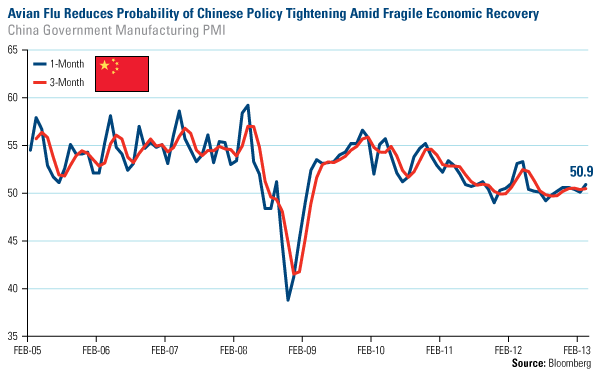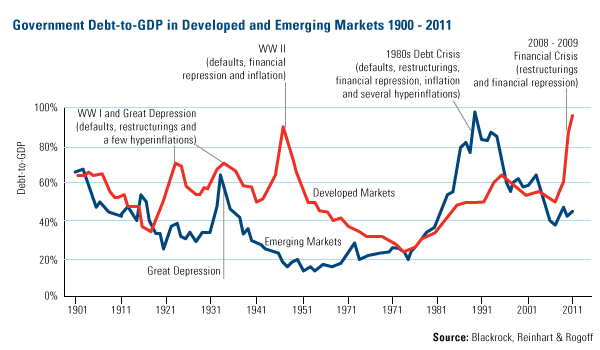Emerging Markets Radar (April 8, 2013)
Strengths
- Macau generated record gaming revenue in March, up 25 percent year-over-year or 16 percent month-over-month.
- China’s major cities released their interpretations or implementations of the State Council’s “New Five-Point Property Measures.” On home price and home purchase restrictions, policies remained largely neutral, except for Beijing and Shanghai which are biased toward the tightening side. On the 20 percent capital gains tax, the policies mostly just simply repeated the exact wording of the State Council’s notice. The market had positively reacted to the announcements by the local governments.
- China March new loans may be RMB1 trillion based on an estimate that new lending by the four biggest banks was about RMB331 billion, Shanghai Securities News reports. Also in anther news by the Economic Information Daily, investments for China’s railways, roads, ports and airports may be almost RMB4 trillion for the three years through 2015.
- China PMI came in at 50.9, up from 50.1 in February, but lower than consensus 51.2, showing the expansionary Chinese economic activities. China’s March non-manufacturing PMI rose to 55.6 from 54.5 in February.
- Hong Kong February retail sales value was up 22.7 percent year-over-year versus the consensus of 15.7 percent.
- Bank of Thailand (BOT), the central bank, kept the policy rate on hold at 2.75 percent this week. BOT expects the Thai economy to moderate toward a normal trend, while the pace of fiscal stimulus is expected to rise gradually in second half of 2013, in line with the start of government spending on infrastructure projects. Thailand just reported February CPI that was 2.69 percent versus the consensus of 3 percent, and 3.23 percent in the previous month.
- The Korean government announced its property stimulus measures, which include capital gains tax reductions, tax and loan benefits for first-time home buyers, and a reduction in public housing supply.
- Mexico’s Finance Ministry submitted to Congress the so-called Pre-General Criteria of Economic Policy, which marks the first step of the reforms proposed by President Pena Nieto. The restructuring in the energy, telecommunications, and financial sectors will be carried together with a tax reform, which Pena Nieto assures will attract greater foreign direct investment, enhance productivity, and accelerate economic development.
Weaknesses
- China reported 16 cases of H7N9 (bird flu) with 6 dead. Officials said there are no human contagions found at the moment, but no vaccines are discovered either. Should the epidemic spread, it will negatively impact the social life and the economic activities.
- China’s home prices rose 1.06 percent in March or 3.9 percent year-over-year to Rmb9, 998 a square meter ($146.6 a square feet), Soufun Holdings Ltd said. Sharp price increases invite tightening government housing policy.
- Korean peninsula tensions are at the highest level in recent years with North Korea threatening to retaliate using nuclear bombs on U.S. military bases and its alliances in North East Asia.
- Indonesia’s exports contracted 4.5 percent in February, and the oil trade deficit stayed wide at $2.3 billion. The trade deficit widened to $327 million from $75 million in January, which indicates economic imbalance between consumption and manufacturing at the moment.
- Brazilian equities continue to underperform their BRIC and South American peers as companies post the longest streak of earnings misses in six years. For the fourth quarter of 2012 over 65 percent of the members of the Bovespa Index trailed analysts’ earnings estimates. The most recent quarter’s information is the fifth straight period in which more than 50 percent of the companies in the benchmark fell short of expectations.
Opportunities
- As shown in the graph above, China March PMI was 50.9, which indicates a weak expansionary economy. With news report that China had found 16 cases of H7N9 (bird flu) and 6 people had died, the probability of tightening the economy by monetary and fiscal policies is extremely low.
- Brazil’s President Dilma Rousseff issued a decree on Thursday that will eliminate payroll taxes in the construction and transportation industries in favor of a 1 to 2 percent tax on gross revenue. In the previous months, similar measures were adopted across multiple sectors to incentivize economic growth and business hiring ahead of presidential elections in 2014.
- While positioning in consumer segments in emerging markets is an increasingly crowded trade that is beginning to stretch valuations, frontier markets generally look a lot more attractive. Higher dividend yields than in emerging markets offer better protection against inflation. Frontier markets also offer superior exposure to the developing world consumer than emerging markets in general, because of market composition, according to HSBC.
Threats
- Reported bird flu in China, if breaking out like the SARS in early 2003, can threaten the overall economic activities, especially tourism, entertainment, retail, and air and land transportation.
- The Colombian Finance Minister has voiced his discontent with commercial and personal lending rates in the country. After the central bank cut benchmark interest rates by 100 basis points so far in 2013, commercial banks have only decreased lending rates by approximately 50 basis points signaling issues in the monetary transmission mechanism. Banco de la Republica has stated its March cut would be the last in the current cycle, leading to speculation that commercial banks, not the central bank, now hold the key to bringing the economy closer to full potential.
- Amid concerns about ballooning G7 public debt, emerging market economies, still smarting from their own mistakes of previous regimes, have been much more disciplined and actually managed to keep debt-to-GDP levels largely stable since the outbreak of the credit crisis in 2007-08.














